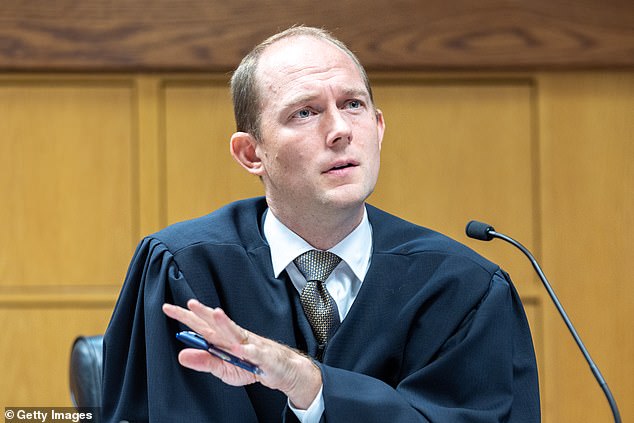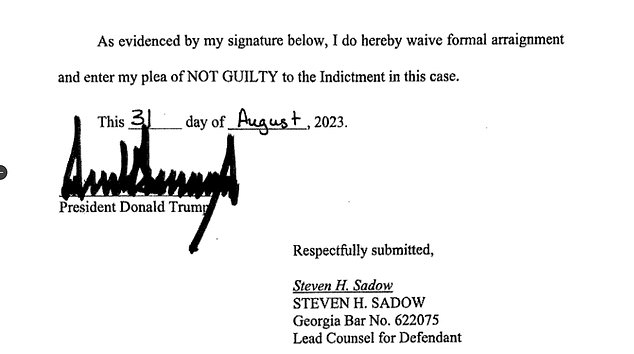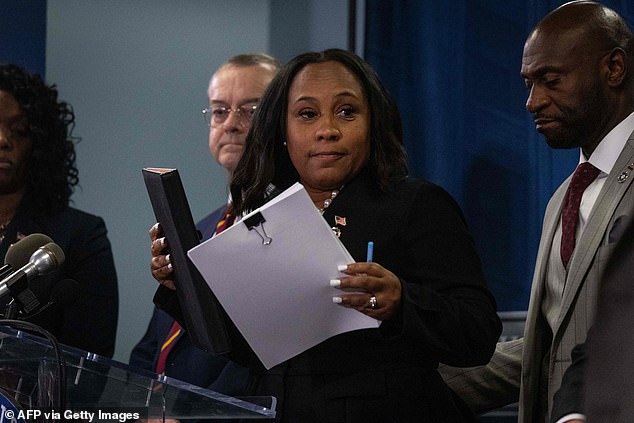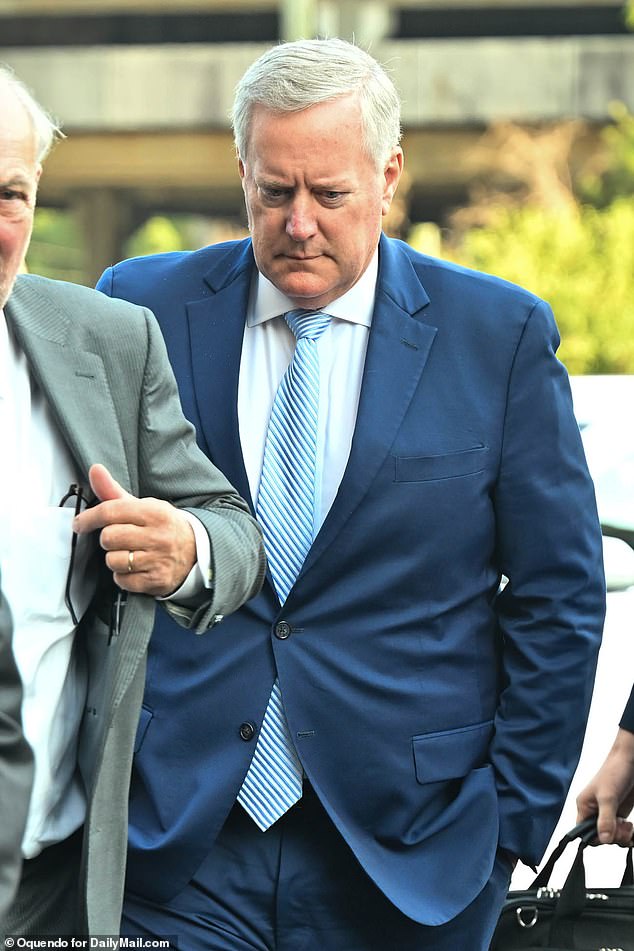All Trump’s Georgia trial will be on TELEVISION: Judge rules ex-president’s case will be broadcast live – along with his 18 co-defendants
The revolution will not be televised, but Donald Trump’s extortion trial in Georgia will, a judge has ruled.
During a hearing Thursday, Fulton County Superior Court Judge Scott McAfee said he would make all hearings and potential trials of the presidential candidate available for broadcast on YouTube and various court news networks.
Hours earlier, Trump — also facing cases in New York, Florida and Washington, D.C. — had pleaded not guilty trying to undermine the 2020 election results in the state, waiving an appearance in court where he would have appeared on television during the trial.
The move comes a week after he posed for his historic mug shot, which became a global media event – and one he’s trying to use to his advantage.
Meanwhile, he and 18 other co-defendants — including his ex-chief of staff Mark Meadows — face 13 felony counts, including racketeering, for allegedly pressuring officials to interfere in the election before losing to Joe Biden.
Trump and 18 allies faced a flurry of indictments earlier this month related to the conspiracy to illegally overturn the results of Georgia’s 2020 presidential election. A judge has now ruled that all proceedings involving the 19 in the Peach State will be televised

During a hearing Thursday, Fulton County Superior Court Judge Scott McAfee said he would make all hearings and potential trials of the presidential candidate available for broadcast on YouTube and various court news networks.
As part of his ruling, McAfee, a former state inspector general, said he will allow news outlets to “pool” cameras in court, where stations can combine resources and share camera access.
Citing the actions of a fellow Fulton County Superior Court judge who live-streamed key parts of the 2020 Georgia investigation against Trump, Judge Robert McBurney, McAfee said Thursday the new case will be no different.
“In keeping with the spirit of transparency here,” McAfee said. “We followed Judge McBurney’s model and we live-streamed all our important proceedings on a YouTube channel provided by Fulton County.
“And our plan was to do the same with this case,” he continued. “So there will be a YouTube feed all the time.”
As for the actual media outlets, McAfee said he may also be open to what some media interveners called an overflow room — due to the number of reporters, photographers, defendants and lawyers who will now be present at the proceedings.
The judge said if attendance grows, a larger courtroom may be required, and will be advanced accordingly.
No one from the defense or prosecution appeared in court to oppose the ruling, which came after several news outlets and publications called for cameras to be installed.
McAfee further ruled that members of the media may use cell phones and electronics in court for non-recording purposes, such as taking notes, but said all devices “should be turned off and (must) not be used to make calls.”

Trump entered a not guilty plea earlier in the day — seen here with his famous signature — avoiding a potential TV spot

The massive racketeering case comes from Atlanta District Attorney Fani Willis, who claims to have collected a body of evidence proving the then president conspired to overturn local election results. She is seen here at a press conference at the Fulton County Government Center after a grand jury voted Aug. 14 to indict Trump

Co-defendant Mark Meadows (pictured arrived Monday at the Fulton County Courthouse, where he sought to move his 2020 election subversion case from Georgia to federal court, where jurors may be more forgiving
The ruling came just days after Fulton County District Attorney Fani Willis released the first details of her racketeering case against the embattled ex-head of state on Monday — in which Meadows, in a surprise move, took the stand to try to get his case. move. to federal court.
Aside from the location change – which is currently under consideration – Meadows wants to avoid a lawsuit altogether, having already asked the FBI to drop his charges if and when they take over the case, which comes from Atlanta DA Fani Willis.
She was present at the press conference at the Fulton County Government Center where a vote was taken to impeach Trump earlier this month and claims to have gathered evidence that the then-president conspired to overturn the district’s election results.
After her case became a “political witch hunt,” Trump, 77, surrendered to police officers at the Fulton County Jail last week before being booked and quickly released on $200,000 bail.
Provisions on that connection include restrictions on the ex-president’s conduct, including provisions prohibiting him from intimidating witnesses or co-defendants.
He faces thirteen charges in the Georgia case, including violating the state’s racketeering law, soliciting a government official to violate his oath, conspiring to impersonate a public official, conspiring to committing forgery and conspiring to submit false documents.
That said, the Georgia case is just one of the legal problems facing Trump. On Monday, a federal judge in Washington DC set a March 4 trial date for the case brought by Special Counsel Jack Smith through his January 6 investigation.
On Wednesday, a federal judge in Washington DC ruled that former Trump attorney Rudy Giuliani defamed two Georgia election aides, moving the case toward a lawsuit for damages.
Giuliani is also one of those charged by Georgia District Attorney Fani Willis, and was also arrested and forced to take a mug shot at The Peach State.
In New York, where Trump is indicted on 34 counts for allegedly falsifying business records related to his $150,000 payment to Stormy Daniels through fixer attorney Michael Cohen, his trial is scheduled for March.
Because many pundits have theorized that Trump is unlikely to go on trial in any of his cases before the 2024 election, Trump’s lawyers argued in it that President Juan M. Merchan had a conflict of interest because he donated $15 to Biden’s 2020 campaign.
Merchan has dismissed their arguments — though local prosecutor Alvin Bragg has suggested he would be open to changing the trial date if other prosecutors who brought the case agree.
In Florida — where he faces alleged mishandling of classified documents after leaving the White House — Trump pleaded not guilty earlier this month and waived his call to appear at a hearing.
However, the politician’s most immediate legal concerns are the case in Georgia, which had a tentative trial date of March 4, 2024, but after one of Trump’s co-defendants, Kenneth Chesebro, asserted his constitutional right to an early trial. Willis’ office moved it to start months earlier, on October 23, 2023.
Trump has decided to postpone both his Florida and DC trials until April 2026 after federal prosecutor Jack Smith, who is handling both cases, asked that they be held in January.
He will be charged on September 6 on allegations made in his indictment against Georgia, which he has labeled “deeply vicious and heinous abuse of power.”
